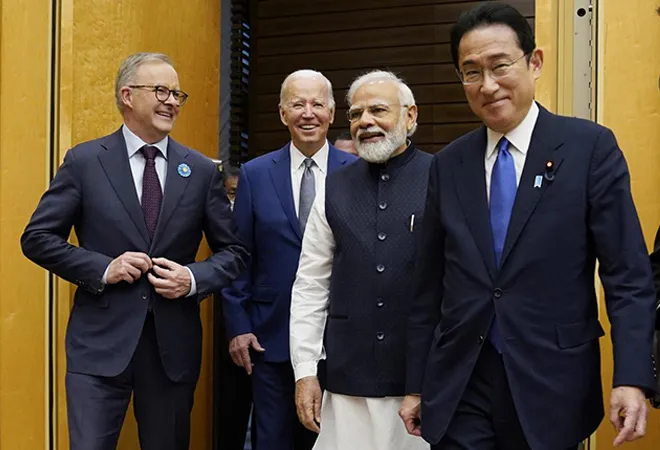
Since the inception of the QUAD 2.0—a multilateral grouping comprising India, the United States (US), Australia, and Japan—in 2017, there have been several deliberations if the Quad will emerge as a security minilateral or even an avowed military grouping, despite repeated
assertions by leaders of the four countries that any such step is unlikely. The rationales for the same put forward by the leaders are based on a rules-based order, that the Quad is a grouping of like-minded countries who are looking to deal with shared concerns and threats emerging in the Indo-Pacific region. Furthermore, the Indo-Pacific has been touted as an inclusive region for democratic countries that are willing to abide by the order as well as contribute towards creating and maintaining a stable and secure region. However, the senior-level military commander’s
meeting of the Quad countries at Sunnylands in California, US, from 15–17 May 2023 just before the Quad leaders’ meeting in Hiroshima, Japan, has stirred debates about whether the Quad would now have an obvious security orientation.
The rationales for the same put forward by the leaders are based on a rules-based order, that the Quad is a grouping of like-minded countries who are looking to deal with shared concerns and threats emerging in the Indo-Pacific region.
This could indeed be a major transformation for the Quad which is walking a tightrope between the necessity to securitise in its attempt to create a credible regional deterrence and its members’ cautiousness vis-à-vis China. The meeting was
hosted by Admiral John C Aquilino, Commander of the US Indo-Pacific Command, and
attended by General Yoshihide Yoshida, Chief of Staff, joint staff, Japanese self-defence forces; General Angus Campbell, Chief of Defence Force, Australia; and India’s Chief of Defence Staff (CDS) General Anil Chauhan. Besides the senior military officials of the four Quad countries, the
presence of a vice-admiral rank representative of the United Kingdom (UK) Chief of Defence staff raises more questions than answers.
Making the ‘Quad Plus’ a reality has been a
possibility for the group’s expansion for some time now. The extension of the invitation by security commanders of the Quad to the UK adds another dimension to a possible expansion of its security role, if not, its core composition itself. Given that the US, Australia, and the UK already have the AUKUS agreement in place which is primarily a security agreement, the presence of an official from the UK in the Quad security commanders’ meet adds more vigour to the already existing curiosity that the group members may be taking initial steps to add security dimensions to the Quad. Albeit, a hard security focus by the Quad may well be currently limited to the Pacific theatre rather than the entire expanse of the Indo-Pacific. The inclusion of the UK is also explained by its
Integrated Review Refresh 2023 which underscores a strong Indo-Pacific focus while highlighting China as a regional challenge.
The extension of the invitation by security commanders of the Quad to the UK adds another dimension to a possible expansion of its security role, if not, its core composition itself.
There are still statements being made to pass this meeting off as a general one, where officials gathered to discuss the common security issue and other challenges that the Indo-Pacific region is currently grappling with. Even if it is, it is unlikely that the inflection will be voiced publicly and is likely to be subtle. For instance, an Indian source
stated that “the gathering is not a part of any such grouping”. According to a statement from the Headquarters of Integrated Defence Staff, in the first session of the Indo-Pacific Security Dialogue, the Indian CDS
presented the Indian views on “deterrence through effective partnerships”. It is difficult to ascertain at this time whether the Quad is indeed “taking security cooperation to the next level”.
Speculations, debates, and analyses pointing to the securitisation of the Quad are not new. Even after the first Malabar exercise—in which the navies of the four countries had participated—there were such speculations, but in the subsequent leaders’ meetings, the joint statements clearly showed that the focus of the grouping would be on non-traditional security issues like vaccine diplomacy, critical and emerging technology, climate change, maritime domain awareness, among others. Scholars like Nilanthi Samaranayake, an adjunct fellow at the East-West Centre in Washington, have
pointed out that non-traditional security issues like natural disasters, “sometimes requires a military response to deliver relief”. It also needs to be taken into consideration, that the origin of the Quad was after the 2004 Indian Ocean Tsunami which required “operational coordination” amongst the navies for conducting relief and rescue operations. Therefore, the Quad was meant to promote cooperation and help in the capacity-building of countries in the region to deal with challenges like natural disasters and climate change-induced security challenges in the maritime domain.
The
joint statement released after the recent Quad leaders’ meeting in Hiroshima showed that the Quad is looking to work more with organisations like the Association of Southeast Asian Nations (ASEAN), the Indian Ocean Rim Association (IORA), and the Pacific Islands Forum (PIF) and their member countries. As such, the biggest challenge that the Indian Ocean and the Pacific Island nations and the archipelagic nations like Indonesia, and the Philippines are facing is climate change which leads to issues like sea-level rise, tsunamis, and other natural disasters. The navies of the Quad countries have to be very active if they want to be among the first to reach out to these littoral nations in times of such crises. This Indo-Pacific Security Dialogue can also be seen from this aspect, where the discussions could focus on how the navies of the Quad countries and the UK can help in the capacity-building and training of the navies of these Indian Ocean and the Pacific Island nations.
The Quad was meant to promote cooperation and help in the capacity-building of countries in the region to deal with challenges like natural disasters and climate change-induced security challenges in the maritime domain.
This Dialogue was hosted by the US which is building alliances and strengthening partnerships to ensure the smooth implementation of the US National Defence Strategy, especially in the Pacific theatre. For instance, during the meeting between India’s National Security Advisor, Ajit Doval, and the US Deputy Secretary of Defence, Kathleen Hicks, in Washington in February 2023
discussed “avenues to deepen coordination between the US and Indian militaries to address the region’s increasingly contested strategic environment”. US Admiral Aquilino has also
noted on several occasions that military cooperation between the two nations is at an all-time high. To ensure greater cooperation and reach in the Indian Ocean Region, the US will need to work with India and deepen its influence in Southeast Asia. Japan remains central to a renewed security focus by the US in the Indo-Pacific. There are talks of a US-Japan-Philippines Trilateral in the Pacific going on. To enhance a secure Indo-Pacific agenda, Australia and the US are working together in implementing the
2050 Strategy for the Blue Pacific Continent adopted by the Pacific Island countries in 2019 in Tuvalu. Furthermore, the US-led
Partners in the Blue Pacific which includes Australia, New Zealand, Japan, and the UK will remain a key grouping to further any security-related agenda in the region. Most of these minilaterals overlap with the Quad in membership and purpose. As the Indo-Pacific becomes more contested, not just for the Quad countries but for smaller regional countries, the Quad countries will have to work together to expand the group’s scope of diplomacy, influence, and perhaps most importantly, its security, as they will find themselves at the helm of their immediate theatres of interest.
Premesha Saha is a Fellow with the Strategic Studies Programme at the Observer Research Foundation.
Vivek Mishra is a Fellow with the Strategic Studies Programme at the Observer Research Foundation.
The views expressed above belong to the author(s). ORF research and analyses now available on Telegram! Click here to access our curated content — blogs, longforms and interviews.



 Since the inception of the QUAD 2.0—a multilateral grouping comprising India, the United States (US), Australia, and Japan—in 2017, there have been several deliberations if the Quad will emerge as a security minilateral or even an avowed military grouping, despite repeated
Since the inception of the QUAD 2.0—a multilateral grouping comprising India, the United States (US), Australia, and Japan—in 2017, there have been several deliberations if the Quad will emerge as a security minilateral or even an avowed military grouping, despite repeated  PREV
PREV



